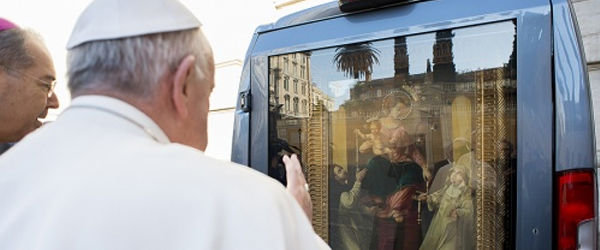Comprehensive immigration reform, the new papacy and other topics of mutual interest and concern to the Catholic and Jewish communities of Los Angeles were addressed March 19 in a special interfaith program at the Sephardic Temple Tifereth Israel in Los Angeles.Archbishop José Gomez and Rabbi Mark S. Diamond, regional director of the American Jewish Committee of Los Angeles, led the evening dialogue — titled “Bonds of Friendship and Fellowship” — in which Archbishop Gomez expressed enthusiasm for the opportunity to continue the “long history of cooperation” between the local Jewish and Catholic communities. He noted that the event coincided with the inauguration of Pope Francis, whom he described as “a good and faithful friend to the Jewish people.”“Pope Francis has a long history of standing in solidarity with the Jewish community and he has long been active in interfaith dialogues,” said Archbishop Gomez. “That’s why we are here tonight, because we are friends, and because we want to know each other better and work with each other. As we go forward in our journey together, I look forward to deepening our friendship, and deepening the spiritual ties that unite us.”Immigration reform was a key topic for both local leaders. Archbishop Gomez was among over a dozen religious leaders from across the country who met March 8 with President Obama at the White House to discuss immigration reform.“I think that we all walked away from the meeting feeling like the president agreed with our concerns,” he said. “So the question for us is, ‘What is our role in immigration reform?’ Our role is to be the voice on conscience — and that’s what’s been missing.”In order to be the voice of conscience and address the real problem, it’s necessary to talk about the issue in moral and human terms, the archbishop explained. The great social justice challenges in America — from anti-slavery, to the civil rights movements of the 1960s, to the culture of life movement today — “would be unthinkable” without addressing their human impact.That human impact includes the fragmenting of families. In the last four years, the government deported nearly 1.5 million people — almost 400,000 in 2012 alone.“We are talking about fathers and husbands … who won’t be coming home for dinner tonight. What we are doing right now betrays our values and makes our culture weaker and more vulnerable; we can find a better way,” said Archbishop Gomez. “Our society needs to be a people of conscience, people who remember and believe that, in God’s eyes, we are all his beloved sons and daughters. No one ever forfeits his humanity or his right to be treated with dignity, no matter where he comes from or how he got here.”In February Rabbi Diamond led a delegation of 25 clergy and community leaders on an immigration study tour of the San Diego-Tijuana border. The two-day visit featured briefings with activists and immigration attorneys, and conversations with immigrants and deportees. “Members of the delegation were deeply moved by what they saw and heard,” he said. He pledged the AJC would continue working “side-by-side with the archdiocese to promote, to achieve, and to implement bipartisan comprehensive immigration reform,” which “must include family reunification, a full path to earn citizenship for those in this country, and effective, humane border control that safeguards our national security.”Like Archbishop Gomez, Rabbi Diamond praised the remarkable progress in Catholic-Jewish relations, from Vatican II’s “Nostra Aetate” document in 1965 to the present. He noted that “bumps and setbacks” can be expected, but that the true challenge lies in how to jointly respond, learn and grow from such setbacks and continue moving forward.“We must remain true, faithful and honest to our respective traditions, and to our partners in our interfaith relations,” he said. “To that end, I believe we need to dig deeper in our interfaith work. We have to do more.” Rabbi Diamond cited various examples, including working together to support church-synagogue partnerships, adult and youth education seminars, and social action and social justice projects — including comprehensive immigration reform.Following the program, Sandra Radoff Bernstein, a member of Temple Isaiah, a reform synagogue in Los Angeles, said that interfaith “events like these should really continue — frequently — because they will help people understand that we are all people of God.”“I think this meeting was very inspirational. Archbishop Gomez seems to be somebody who can inspire this model [of interfaith dialogue] with other groups as well,” said Bernstein, who complimented the archbishop, Rabbi Diamond and Father Alexei Smith, director of the archdiocesan Office of Ecumenical and Interreligious Affairs, for their efforts. “I’m so overjoyed to see this happening. It’s just a very pleasant way to get to know each other.”Leah Barshap, a member of Wilshire Boulevard Temple in Los Angeles, agreed.“I thoroughly enjoyed the event because I think the only way people can relate to each other is through conversation,” said Barshap, noting that communication helps foster fellowship within her own family, between Catholic and Jewish relatives. “We know each other, we love each other, we respect each other. I attend church for the Communions, and they attend bat mitzvahs. [Interfaith programs] are doing the same for the larger community.”{gallery width=100 height=100}gallery/2013/0329/ajc/{/gallery}

